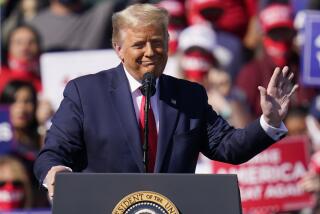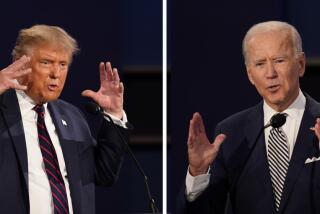Picking John McCain’s temporary successor won’t be easy in pro-Trump Arizona
Arizona Gov. Doug Ducey might as well be looking for a unicorn.
As he chooses a temporary successor for Sen. John McCain, the Republican governor will have to thread a needle that respects McCain’s legacy as a GOP iconoclast, but also recognizes the popularity of McCain’s political nemesis, President Trump.
The pressure couldn’t be higher. McCain’s successor will likely be in place to cast a high-profile vote on Trump’s Supreme Court nominee, Brett M. Kavanaugh. And Arizona voters will get an opportunity to weigh in — indirectly — on Ducey’s decision when he asks them on election day this fall for another term in office.
“These are extraordinary circumstances in an extraordinary political moment,” said Stan Barnes, a Republican political consultant in Arizona. “It’s got national implications, important Arizona implications and personal political implications for a governor.”
The tension in Arizona is a reflection of the national divide within the GOP among Trump loyalists, Never Trumpers and those who try to wiggle into an uncomfortable spot between the poles.
“Does the governor believe he somehow owes the politics of John McCain, or does he recognize the politics of Donald Trump?” Barnes said.
More than half of Arizona voters — 61% — want a successor who fits the McCain mold of an independent who is willing to buck his party, according to a recent poll conducted by Public Policy Polling.
But any appointee will have to figure out how to embrace McCain’s maverick style without alienating Trump supporters in the state. Trump won Arizona in the 2016 election, albeit with one of the smallest margins — 49% — of any state.
GOP leaders, meanwhile, want someone who will be a more reliable vote in the Senate, where Republicans hold a razor-thin, 51-seat majority. That means Republicans can only afford to lose one member in close votes, assuming all Democrats are united. McCain had a history of going his own way. Last year he famously cast one of the deciding votes to kill the GOP effort to repeal Obamacare.
Among the names floating in Arizona’s Republican circles are McCain’s widow, Cindy McCain; former Reps. John Shadegg and Matt Salmon; former Sen. Jon Kyl, and top Ducey aide Kirk Adams.
“When you look at who would be an uncontroversial steward of the seat, Jon Kyl is obvious,” said Arizona GOP political consultant Jason Rose.
Some view Salmon as the Republican with perhaps the best electoral chances in 2020 and beyond. In 2002, he narrowly lost the governor’s race to Janet Napolitano.
Ducey is expected to announce a successor as soon as next week. A spokesman said the governor would not make an announcement or publicly speculate on a name until after McCain is interred at the U.S. Naval Academy on Saturday.
McCain and Ducey were close — a factor that could suggest that the former’s legacy will play a role in the governor’s decision.
“While a segment of the Arizona Republican Party was estranged from McCain, that was not this governor,” Rose said.
One aspect of the decision will be whether he picks someone who more or less agrees to take the job for only two years, or whether he wants someone who intends to hang onto the seat and run again in 2020.
Appointing a so-called caretaker to the job would invite a wide open Senate contest in 2020 that Ducey could jump into. But that scenario appears less likely, according to Republican sources.
Because of the timing of the appointment, the person chosen will have to go before Arizona voters several times in the near future if he or she wants to remain in the job. A typical Senate term lasts six years. But he or she would have to be reelected in 2020 — when Trump will also be on the ballot — to fill the last two years of McCain’s term and again in 2022 for his or her own full term.
The results of last week’s Arizona primary election — in which Rep. Martha McSally bested firebrands Kelli Ward and Maricopa County Sheriff Joe Arpaio for the GOP nomination in the race to replace Sen. Jeff Flake — suggest a successful model of supporting Trump without being as bombastic as the president.
Even Democrat Kyrsten Sinema has avoided making opposition to Trump the only selling point in her race, unlike Democrats running in states where Trump is less popular.
In Washington, McCain’s death leaves a void in the GOP, particularly on the issues that he championed, such as the military, national security and foreign policy. McCain’s was a singular voice whose support or opposition for an issue could determine the fate of legislation.
“Anytime you lose a voice like that, then it’s one more moderating influence that you’ve got to go find,” said Sen. Thom Tillis (R-N.C.). “You just want a good independent [senator], comfortable in their own skin, willing to settle for something less than you would even consider the ideal, if it moves in the right direction. That’s, to me, one of the single greatest losses.”
jennifer.haberkorn@latimes.com
Twitter: @jenhab
More to Read
Get the L.A. Times Politics newsletter
Deeply reported insights into legislation, politics and policy from Sacramento, Washington and beyond. In your inbox three times per week.
You may occasionally receive promotional content from the Los Angeles Times.







